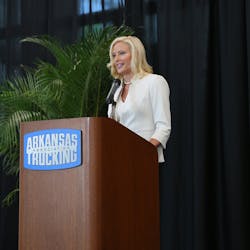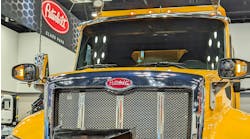Trucking is a major industry in Arkansas. “We're actually No. 1 in the country and per capita for trucking employment,” said Shannon Newton, president of the Arkansas Trucking Association. Because trucking is a critical part of the state’s economy, Newton and her team play a prominent role in representing and supporting those in the industry.
“We're here to advocate on behalf of the industry to make sure that ideas don't turn into bad public policy, and to make sure that those who are in charge of making rules and regulations understand how they impact the business and the industry of trucking,” Newton explained.
Newton wears many hats in her day-to-day job, including management responsibilities with employees, budgets and oversight, support for policymaking, as well as public relations and member relations.
“I do love that about my job, with all of the diversity and the freeform nature that is association work and advocacy, it’s never the same,” Newton said. “You get to play to your members’ strengths and your team’s strengths. Individuals who work at the association have different strengths, so we tend to flex the association in areas where we have relationships or talents.”
Newton works with a variety of people on any given day. That is what makes her job so meaningful and enjoyable. “No one enjoys what they do if they don't enjoy who they do it with,” she said. The range of individuals and groups Newton works with spans from her internal staff, to small fleets who rely on support from the state association, to relationships built with representatives of Fortune 500 companies such as J.B. Hunt, Walmart and FedEx Freight, all with headquarters in Arkansas.
“You're just trying to be helpful; to our smaller members who might not have as many resources, and then helpful to our larger members who may be tuned into some bigger policy discussions or trying to advocate for different issues,” Newton explained.
She also works closely with peers that run other state trucking associations, as well as with the American Trucking Associations (ATA). One reason for the close relationship with ATA is because the majority of Arkansas Trucking Associations’ members are long-haul fleets that cross state lines and are more widely impacted by federal regulations.
A look back, and toward the future
Newton has been serving the trucking industry for nearly two decades. She graduated from the University of Central Arkansas with degrees in accounting and computer information systems, securing a job with Little Rock, Ark.-based Maverick Transportation right out of college. In June 2003, after a year at Maverick, Newton took a job at the Arkansas Trucking Association to keep the books and manage the association’s small carrier insurance program.
“I've had a few different titles, between then and now,” Newton said. “But as odd as that is in this day and age, I don't know anything other than trucking.”
When it comes to the industry, Newton has kept her pulse on perpetual trends and challenges that remain at the forefront of trucking, such as insurance costs, highway funding, technology advancements, the economy, and the driver shortage.
“In my position, I feel like we're problem solvers; we serve to prevent problems from happening or resolve them once they do,” Newton said. “When you take the driver shortage, how do we materially impact that for our members? That's often something that's hard to check boxes and mark that off the list.
“If you're a list maker like me, you never get to cross that one off,” she continued. “That’s a challenge for me – being able to feel like you're making an impact or moving the needle, yet some of the challenges never truly go away.”
Through all of her interactions, Newton’s ultimate goal is to help advance the trucking industry – both by supporting those already involved, and by showcasing the necessity and value of trucking to those not in the industry.
“I love it, I love everything about it. I love the essentiality and the way that the industry is so tangible and the service that it provides,” Newton said. “Everyone, regardless of where you are in the country, where you are socioeconomically, where you are in the supply chain, everybody utilizes the services provided by the trucking industry.”
When Newton first joined the industry, she wasn’t sure what to expect. But one thing she recognizes now is that she underestimated the impact of trucking before becoming involved. “I just didn't appreciate the scale of the industry and the opportunities that existed within it,” Newton advised.
Due to the COVID-19 pandemic, the industry’s expansive reach has been highlighted as commercial trucks deliver goods and materials across the U.S.
“The health crisis has changed the way that we all live. The last three months have shone a very bright spotlight on who truck drivers are, what the trucking industry does and how critically important it is to both our economy and our way of life,” Newton said. “I do think that they're bright days ahead for trucking. I think that there will be a residual impact from the way that people think about truck drivers.”
“There will always be the challenges that we have tried to erode and tackle to make the industry better,” Newton continued. “There will always be new technology. There will always be a safer way to do it and more efficient way to do it. The industry will continue to evolve and all those opportunities we have, hopefully it continues to improve the safety and the performance of the industry as a whole.”





